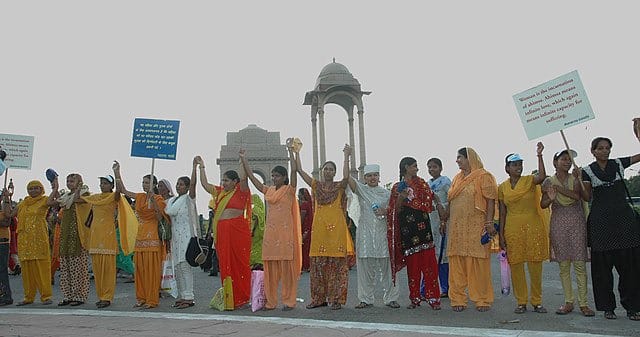By S. Ameenul Hasan
New Delhi, Aug 26: The brutal rape and murder of a 31-year-old postgraduate intern doctor in a prestigious Kolkata medical college on August 9, 2024, has once again brought the issue of women’s safety in India to the forefront. The horrific details of this crime have sent shockwaves across the nation, sparking widespread demands for justice and legal reforms.
Kolkata, once considered one of the safest cities for women, is now under scrutiny as this tragic incident raises critical questions about the safety of women in India. According to the National Crime Records Bureau (NCRB), over 445,000 crimes against women were reported in 2022, with more than 31,000 cases involving sexual assault. These figures highlight the urgent need for consistent efforts to ensure women’s safety, not just by law enforcement but by society at large.
The NCRB’s 2018 data reveals that 338,000 crimes against women were recorded, with rape cases constituting 10 percent of these incidents. Disturbingly, 94 rapes were reported daily in 2018, underscoring the alarming vulnerability of women across the country.
Particularly concerning is the fact that 25 percent of rape victims are children, and 94 percent of crimes against women are committed by individuals known to the victims. This grim reality has positioned India among the top ten countries with the highest incidence of crimes against women.
The recent protests by medical professionals following the Kolkata doctor’s murder have been mirrored by other tragedies, such as the sexual assault of two young girls in Maharashtra’s Badlapur town. These incidents reflect a growing lack of fear among criminals and a pressing need for more stringent legal measures.
Despite legal amendments to address violence against women, the 2022 NCRB report indicates a 20 percent rise in sexual crimes compared to the previous year. Society’s silence in the face of such atrocities has been identified as a significant factor contributing to the rising crime rates.
The current situation is exacerbated by the fragmented response to crimes against women, with protests often divided along communal and caste lines. This division weakens collective action and allows perpetrators to evade justice, highlighting the need for a unified stance against such crimes.
From an Islamic perspective, severe punishments for grave crimes, including rape, are seen as essential for deterring criminal behavior and maintaining social order. The Supreme Court’s recent formation of a national task force (NTF) to enhance the safety of medical professionals is a step in the right direction, with recommendations expected on improving security within hospitals and implementing stricter protocols.
However, a recent report by the Association for Democratic Reforms (ADR) reveals that 16 sitting MPs and 135 MLAs are facing charges related to crimes against women, including serious offenses like rape and acid attacks. This situation poses a grave threat to the rule of law and the integrity of the democratic system in India.
The psychological intoxication of power in Indian society, where individuals in authority often misuse their positions, is another factor contributing to the rise in sexual crimes. The belief in accountability in the Hereafter and the Oneness of God (Tawheed) is proposed as a means to curb this misuse of power.
Historical examples, such as the actions of Caliph Umar bin Abdul Aziz in protecting a woman’s rights, offer lessons for modern rulers on the importance of safeguarding citizens’ dignity and property. Unfortunately, the current attitude of some rulers in India contrasts starkly with this ideal, as incidents of oppression against vulnerable sections of society continue to rise.
In light of these challenges, it is imperative for society to demand the protection of fundamental rights, including the right to life, property, and dignity, as outlined by Islamic law. The public must work together, regardless of religious or community affiliations, to combat sexual violence and ensure justice for all victims.
Women, particularly Muslim women, are encouraged to participate in peaceful protests demanding harsh penalties for sexual crimes and adequate justice for victims, transcending communal divides. It is crucial to recognize that protecting women’s dignity is a shared responsibility between the individual, society, and the state, and efforts must be made to create a safe and honourable society for all.
[The writer is Vice President, Jamaat-e-Islami Hind]




